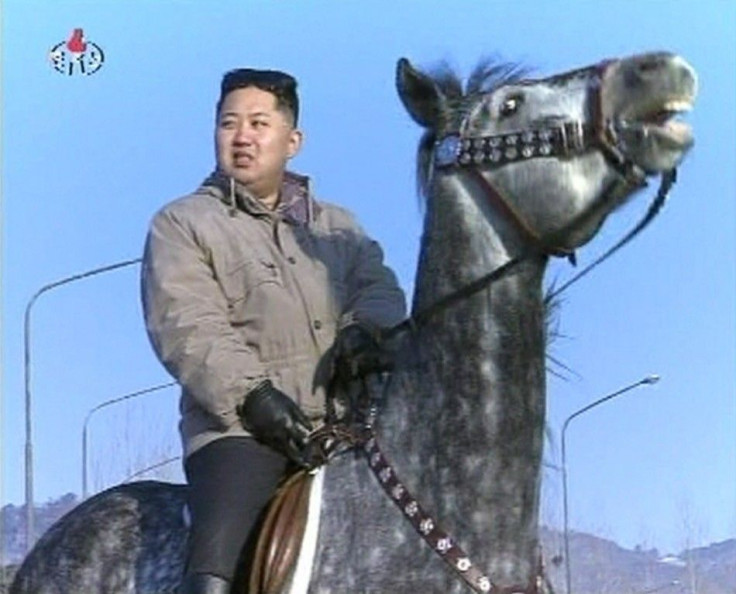Fools Rush In: North Korea And China Tie The Economic Knot
ANALYSIS

North Korea and China have entered into a joint agreement to strengthen their economic ties, according to a statement from the Chinese government on Tuesday.
The deal was signed in Beijing by Chinese Commerce Minister Chen Deming and North Korean diplomat Jang Song-Thaek, who is the uncle of leader Kim Jong-un.
"Both sides agreed that with the mutual effort of government and enterprise from both countries, cooperation in developing the two economic zones has already yielded impressive [and] remarkable results, and has entered the stage of substantive development," said the statement from Beijing's Ministry of Commerce, according to Bloomberg.
The "two economic zones" mentioned are Rason, a port city at the northern end of the Korean peninsula, and the island of Hwanggumpyong, which sits in the Yalu River between China and North Korea. China will deliver infrastructure and assistance in order to ramp up several industries, including agriculture, manufacturing and tourism, in these designated areas.
Economic progress that has the potential to benefit the citizens of North Korea would be a welcome change. International isolation, rampant poverty, and endemic food crises plague this country of more than 24 million people, while a smiling young Kim Jong-Un and the high-level officials who surround him continue to spend heavily on defense -- and their own lavish lifestyles.
According to a United Nations report in March, more than 6 million people in North Korea are in desperate need of international food aid. The U.S. has been a prominent food aid donor to North Korea in the past, but virtually none has been delivered since early 2009.
And so Pyongyang has turned to the world's second-largest economy for assistance. That's nothing new, but the relationship has only strengthened in recent years, according to a June report from the Council on Foreign Relations.
"North Korea's trade dependency on China has skyrocketed in the past year, reaching $5.63 billion in 2011, an increase of 62.5 percent from $3.46 billion in 2010," said the report.
"Meanwhile, trade with South Korea, which is North Korea's second largest trading partner, dropped by ten percent in 2011 to $1.71 billion. As a result, North Korea's trade dependency on China appears to have risen dramatically."
But in order to cooperate with North Korea, China must turn a blind eye to the many injustices that take place there every day.
North Korea has a reprehensible record for human rights. It goes far beyond the unrepresentative political system, the strict censorship of speech and media, and the military brinkmanship that often results in a cut-off of the food aid the population so desperately needs.
The country is also known for its brutal gulags, where up to 200,000 citizens perform forced labor as penance for ill-defined, and sometimes unspecified, "crimes" against the state.
But China has so far been unwilling to address these issues. Even North Korea's nuclear ambitions -- which would endanger stability in northeast Asia if realized -- have been censured only vaguely by Beijing.
Ralph Cossa and Brad Glosserman of the Center for Strategic and International Studies wrote a report on the situation in May, arguing that China's maneuvering on the issue has been deplorably short-sighted.
"China enables Pyongyang's misbehavior. When dealing with North Korea, China walks softly and has discarded the stick," they wrote.
"Whether motivated by ties once close as 'lips and teeth,' the desire to maintain whatever leverage China has in Pyongyang, or the fear that pressure might destabilize the North or prompt it to act out, Beijing refuses to crack down on Korean misdeeds. Instead, it offers diplomatic cover and minimizes any punishment that might be agreed on by the international community."
This policy has the long-term effect of strengthening South Korea's and Japan's relationships with the United States. In such an environment North Korea, the diplomatic black hole of Northeast Asia, could begin to exert surprising force on its only ally, slowly loosening many of China's ties to the wider international community.
"We could be snarky and say we're pleased that China is helping the U.S. achieve its foreign policy objectives," wrote Cossa and Glosserman. "But it is more accurate to see that we, like our South Korean and Japanese colleagues, are frustrated by the consequences of Beijing's self-defeating policies."
Beijing may be defeating itself in more ways than one, especially after Tuesday's economic deal.
By ignoring Pyongyang's political situation while supporting the country's struggling economy, China opens the door to liberalization in North Korea. Grassroots-level change is probably a very long way off, but an embryonic perestroika in Pyongyang could be a first step toward social progress.
This week's economic deal in Beijing isn't the only sign of impending -- albeit slight -- reforms. The new leader Kim Jong-un seems inclined to pursue a different route from that of his father. He regularly smiles for the camera, something Kim Jong-il rarely did in his later years, and seems open to Western cultural influences including food, fashion and Disney cartoon characters.
Kim Jong-un has also reportedly begun to overhaul the governmental infrastructure, according to Reuters. His plans are said to include new agricultural policies, as well a shift of administrative power from the military to more qualified members of the cabinet.
In another surprising development, North Korea is slated to begin talks with Japan later this month. It will be the first meeting between Pyongyang and Tokyo officials in four years.
Of course, another hasty missile launch or nuclear test in North Korea could easily throw the West for a loop once again. But given the overall trends, China's connection to North Korea does not seem so secure in the long run. And by signing economic deals while refusing to address the governance failures of Pyongyang, Beijing risks eliciting the animosity not only of the Western world, but also, eventually, of the North Korean people themselves.
© Copyright IBTimes 2024. All rights reserved.






















